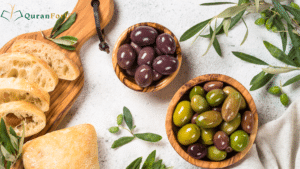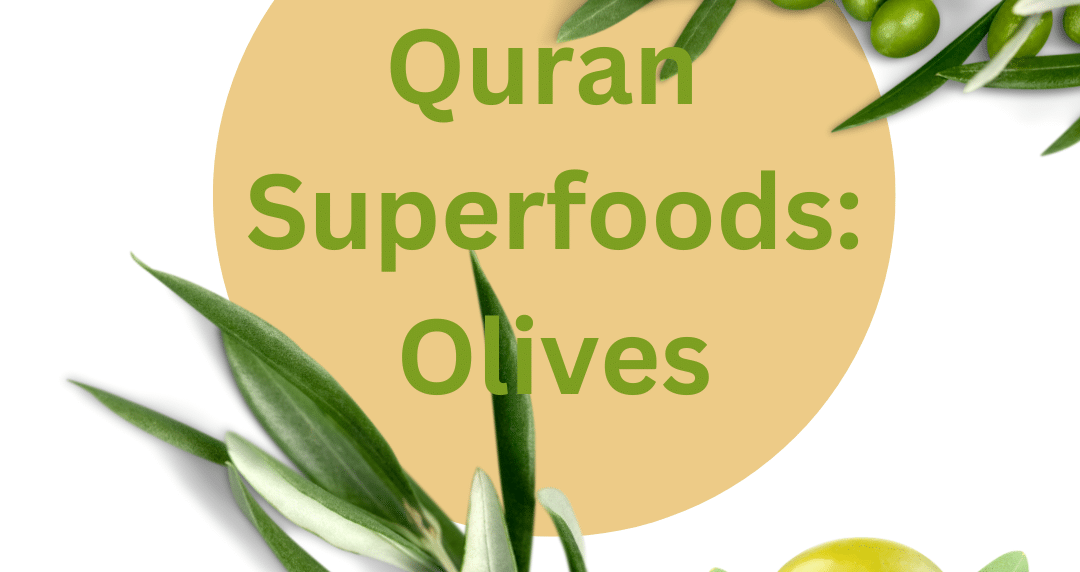
Olives in the Quran and their Health Benefits
Olives are one of the most commonly mentioned foods in the Quran. Allah describes them as a crop that is grown for the benefit of humanity. Not only are they mentioned for their spiritual significance, but also for their many health benefits.
Let’s take a closer look at what the Quran has to say about olives and their benefits.
Olives in the Quran :
The Quran mentions olives several times as a sign of Allah’s power and as a symbol of the many blessings He has bestowed upon us. Here are some of the verses that mention olives:
“وَالنَّخْلَ بَاسِقَاتٍ لَّهَا طَلْعٌ نَّضِيدٌ، وَالْحَبْلُ مَنْثُورٌ، وَالرُّمَانُ وَالزَّيْتُونُ” [سورة الطور: 19-20]
“وَشَجَرَةً تَخْرُجُ مِن طُورِ سَيْنَاءَ تَنبُتُ بِالدُّهْنِ وَصِبْغٍ لِّلْآكِلِينَ” [سورة المؤمنون: 20]
“وَالتِّينِ وَالزَّيْتُونِ، وَطُورِ سِينِينَ” [سورة الطيبة: 8]
And here are the English translations:
“And [by] the fig and the olive. And [by] Mount Sinai. And [by] this secure city [Makkah]” [Quran 95:1-3]
“And [We brought forth] a tree issuing from Mount Sinai which produces oil and food for those who eat. Indeed, there are signs for people who reason.” [Quran 23:20]
“And [by] the fig and the olive and [by] Mount Sinai. And [by] this secure city [Makkah]” [Quran 95:1-3]
Health Benefits of Olives :
Olives are not only a delicious and versatile food, but they also offer many health benefits. Here are some of the ways that olives can improve your health:
-
Protection against heart disease :
Olives are rich in monounsaturated fat called oleic acid, which has been linked to reducing the risk of heart disease. Eating olives regularly can also help lower LDL (bad) cholesterol levels and increase HDL (good) cholesterol levels.
-
Antioxidant properties :
Olives contain high levels of antioxidants that can help protect against diseases like cancer and Alzheimer’s disease. These antioxidants also help to reduce inflammation throughout the body.
-
Rich in vitamins and minerals:
Olives are an excellent source of vitamin E, which is important for maintaining healthy skin, and they also contain iron and copper, which are essential for preventing anemia.
-
Promotes digestive health:
Olives are a good source of dietary fiber, which can promote healthy digestion and help prevent constipation.
-
Reduces the risk of osteoporosis :
Olives are also a good source of calcium, which is important for maintaining strong bones and reducing the risk of osteoporosis.
Incorporating Olives into Your Diet:
Olives can be eaten in many different ways and are a delicious addition to any meal. Here are some ideas for incorporating olives into your diet:
- Add olives to a salad for extra flavor and nutrition
- Use olive oil as a healthy alternative to butter or margarine
- Make a tapenade with olives, garlic, and olive oil and use it as a spread on bread or crackers ( Check our complimentary Moroccan Tapenade recipe!)
- Add olives to pasta dishes for a Mediterranean twist
- Use olives as a topping for pizza instead of meat or vegetables
Conclusion
Olives are a versatile and delicious food that have been praised for their many health benefits in the Quran. Incorporating olives into your diet can help improve your heart health, protect against diseases like cancer and Alzheimer’s, promote digestive health, and reduce the risk of osteoporosis. Olive oil, a key component of the Mediterranean diet, is known for its numerous health benefits and is widely considered one of the healthiest oils to consume. Make sure to sign up for Quranforu newsletters to stay updated on our series about nutrition in the Quran and the benefits of other foods mentioned in it.
Recipe for Moroccan Tapenade of Olives:
Ingredients:
- 1 cup of pitted Kalamata olives
- 1/2 cup of pitted green olives
- 1/4 cup of capers
- 3 cloves of garlic, minced
- 2 tablespoons of lemon juice
- 2 tablespoons of olive oil
- 1 teaspoon of cumin
- 1/2 teaspoon of paprika
- Salt and pepper to taste
- Chopped fresh parsley, for garnish
Instructions:
- In a food processor, pulse together the Kalamata olives, green olives, capers, and minced garlic until finely chopped.
- Add in the lemon juice, olive oil, cumin, and paprika, and pulse until well combined.
- Taste the tapenade and season with salt and pepper as desired.
- Transfer the tapenade to a bowl and refrigerate for at least an hour to allow the flavors to meld together.
- When ready to serve, garnish the tapenade with chopped fresh parsley and serve with bread, crackers, or vegetables for dipping.
This Moroccan tapenade of olives is a delicious and flavorful spread that can be enjoyed as an appetizer or snack. It’s also a great addition to sandwiches, wraps, and other dishes. Enjoy!

1 Comment
Faris Hussain
I like the article!